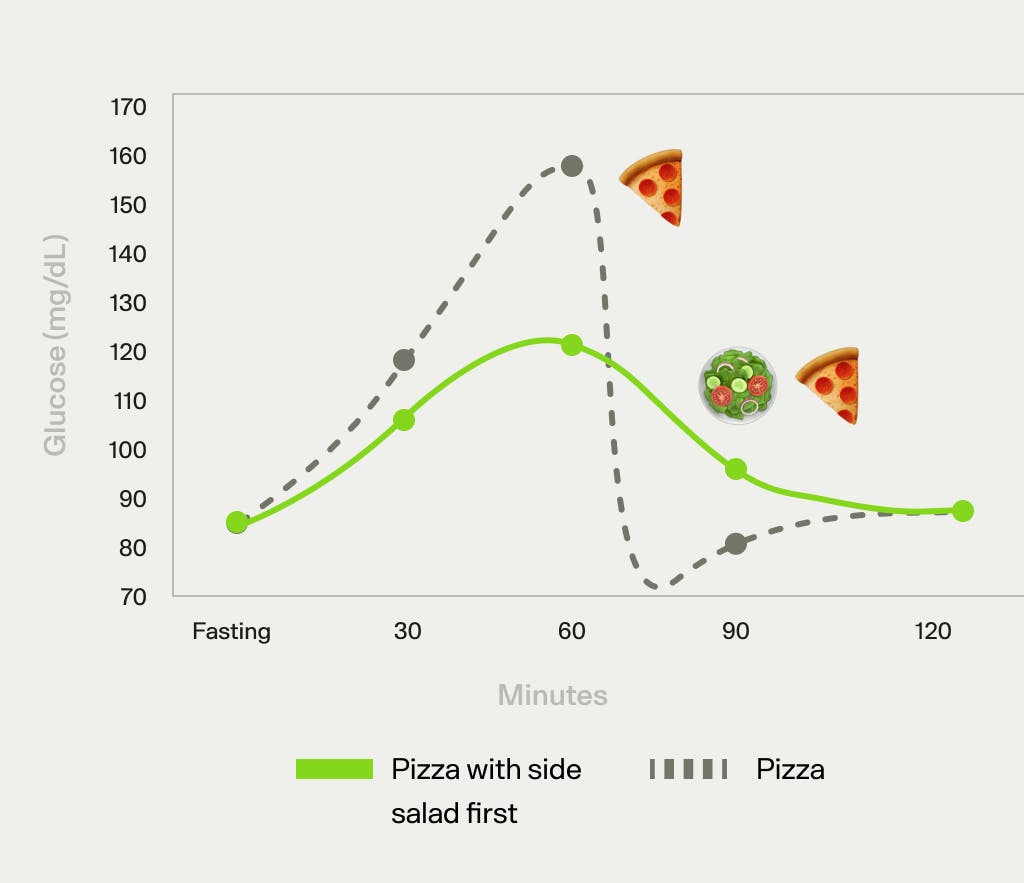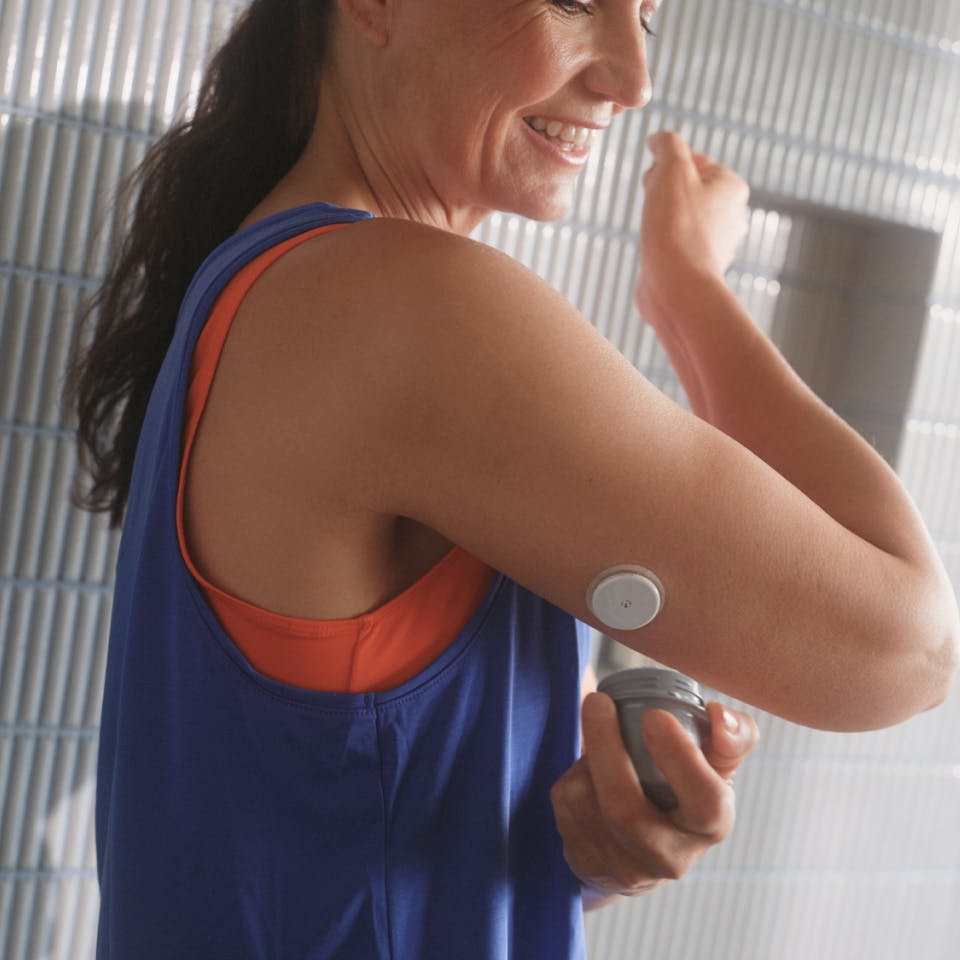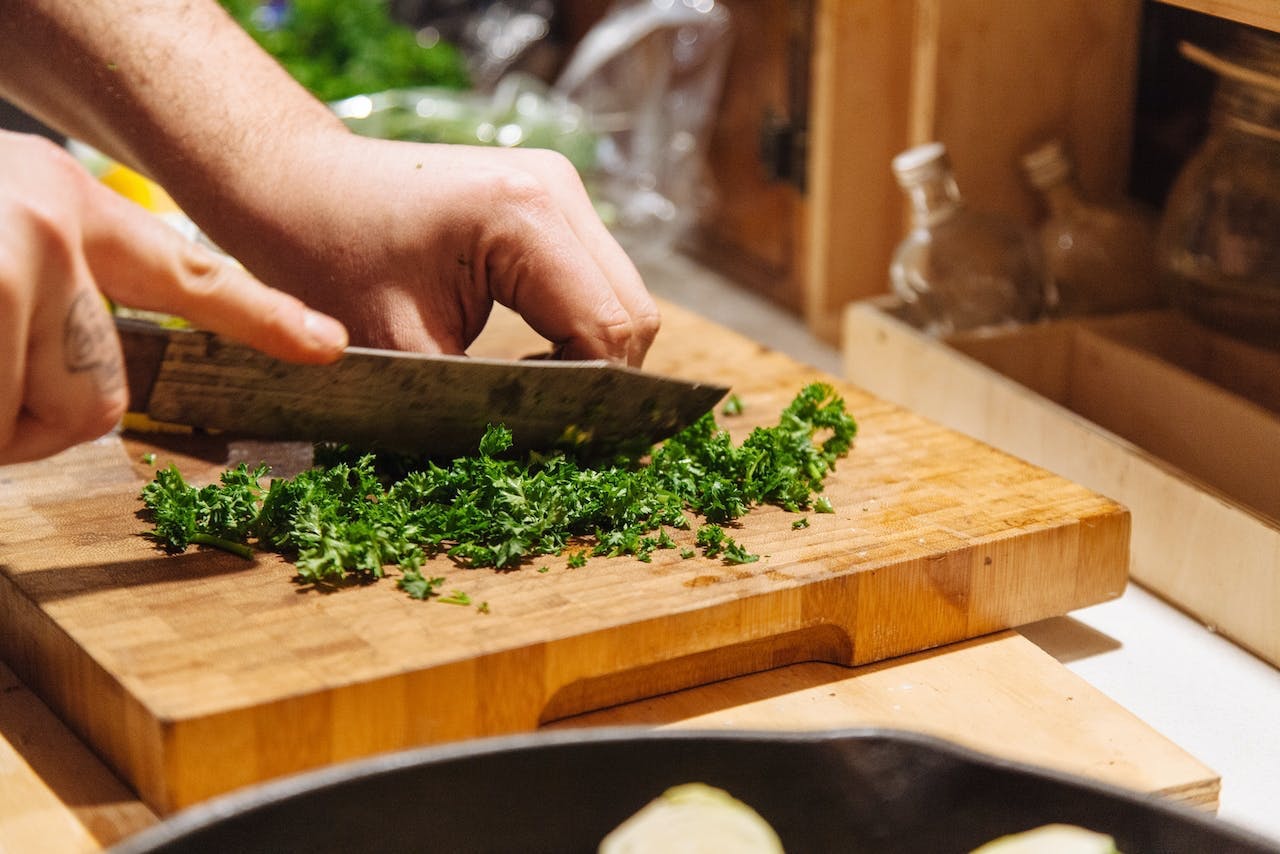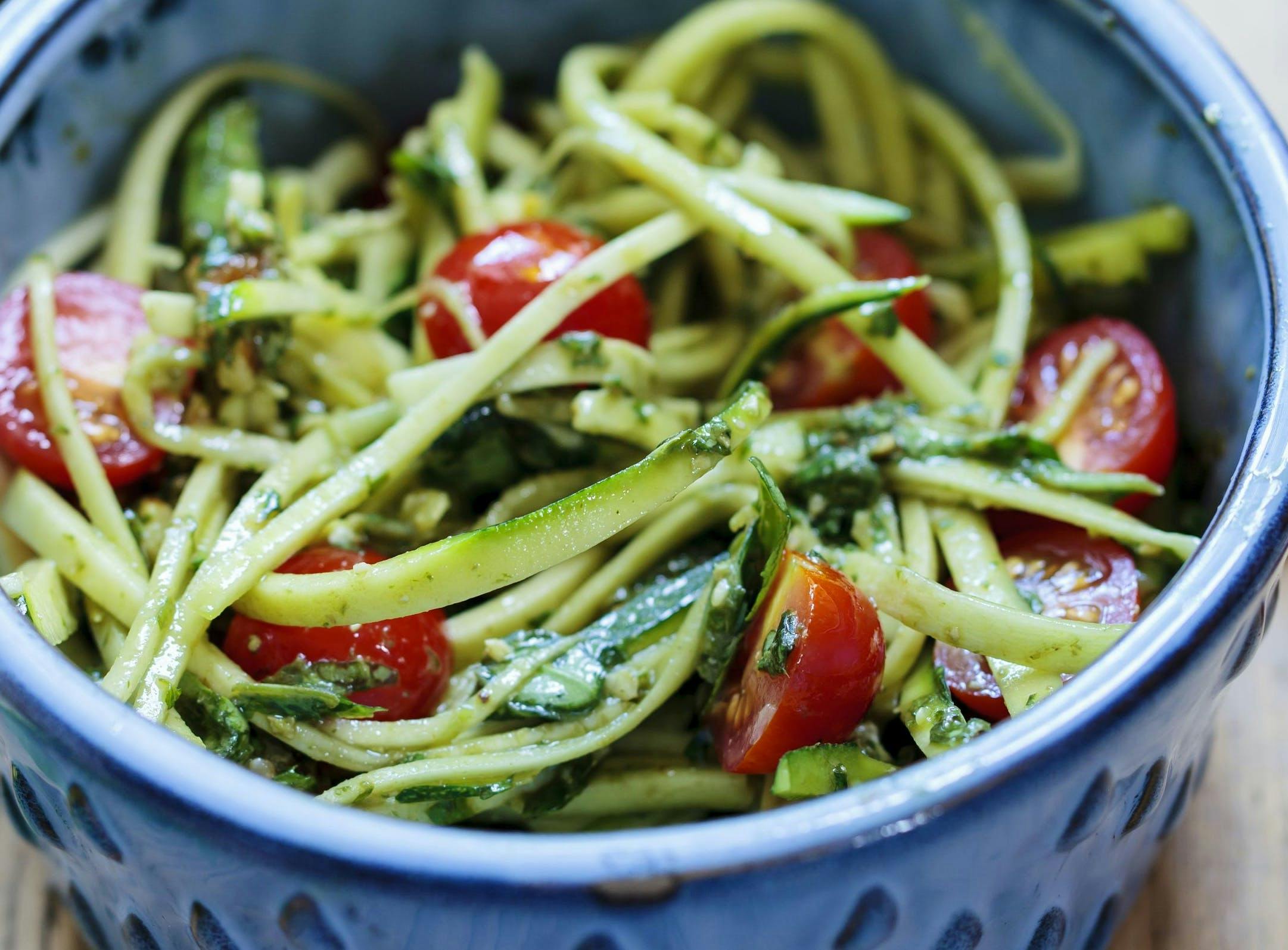Meet Jessie Inchauspé, known by many as the Glucose Goddess, and Kate Murphy of Life With Kate (formerly Kate’s Clean Life). In the video below, Kate interviews Jessie about high blood sugar and glucose spikes, as well as factors besides food that affect glucose.
As a biochemist and bestselling author, Jessie provides viewers with glucose hacks backed by science that help curb cravings and manage blood sugar. During the interview, the Glucose Goddess reveals the detrimental effects of high glucose spikes and shares her valuable insights on stabilizing blood sugar, including the use of continuous glucose monitoring. Join us as we explore the factors influencing glucose and discover practical hacks for a healthier lifestyle.
What is glucose and why is it important?
Glucose serves as the body's primary source of energy. It plays a fundamental role in powering our muscles, metabolism, and overall bodily functions. If left unchecked, elevated glucose levels can lead to or worsen a number of chronic diseases, such as Type 2 diabetes, PCOS, dementia, and heart disease. On a daily basis, drastic fluctuations in glucose levels can have impacts on cravings, anxiety, mood swings, bad sleep, skin problems like acne, and weight management–particularly with hormones that regulate appetite and fat storage.
Factors that affect glucose
- Many factors outside of our control, like genetics, hereditary factors, age, sex, and race, can impact how our body regulates glucose.
- There are many modifiable lifestyle factors, such as sleep, stress, exercise, and diet, that also impact how our body responds to glucose – these are the areas that we can focus on to build a metabolically healthy lifestyle.

5 food tips for stabilizing glucose levels
Like the Glucose Goddess says: “It's not about getting rid of the chocolate in your life, it's about figuring out how you can eat the chocolate in a way that’s not going to hurt your body as much.” Try some of these practical tips from the Glucose Goddess and Veri to stabilize blood sugar levels while still enjoying the foods you love.
- Pair carbs with protein to slow down the absorption of glucose and prevent sharp spikes. For example, the Glucose Goddess eats two eggs about 25 minutes before a carbohydrate-rich/high-glycemic meal, like pasta, to help mitigate the post-meal glucose surge.
- Add fiber-rich foods, such as vegetables and whole grains, and healthy fats, like avocado or nuts. These foods regulate glucose levels by slowing sugar absorption into the bloodstream.
- Try to minimize refined carbs. Foods like white bread, pasta, and sugary snacks can lead to rapid glucose spikes, which can lead to excess insulin production. Excess insulin can actually make blood glucose levels drop after a spike, making you hungry again. Flattening glucose spikes after a meal leads to fewer rebound effects and cravings later.
- Consume apple cider vinegar with meals to help slow down the release of glucose into the bloodstream, aiding in glucose control. [1]
- Try a supplement like cinnamon, chromium, berberine, and magnesium. These support lower blood glucose and improved glucose regulation.
4 meal timing tips for optimal glucose regulation
The timing of your meals can impact your glucose regulation significantly – luckily, there are several strategies you can use to help stabilize blood sugar levels.
- Avoid carbs on an empty stomach. When extremely hungry, consuming carbohydrates can lead to faster glucose absorption. If you've been fasting or practicing a form of time-restricted eating, start with protein or fiber-rich foods before adding carbohydrates to your meal.
- Front-load your carbs – it can be helpful for glucose regulation to eat the majority of your carbohydrates during a morning meal, when insulin sensitivity is typically higher.
- Listen to your body for hunger cues to guide your meal timing. Not everything works for everyone, and the way your body responds throughout the day is highly individual. If you are feeling hungry or fatigued, it’s probably a good guess that you need to eat.
- Doing some light exercise, such as a quick walk, can help direct the glucose to be used by your muscles first instead of staying in your bloodstream or being stored as fat, especially after a carb-heavy meal. Engaging in physical activity before eating can also help your body better manage glucose levels by using the energy from the food you consume.
4 surprising foods that spike blood sugar
Many foods that we think are healthy options may surprise you – and can actually negatively impact your blood sugar levels. The Glucose Goddess mentions these four foods in particular:
- Grapes: Despite their reputation as healthy (it’s fruit!), grapes can cause significant glucose spikes due to their high sugar content. Instead of grapes, enjoy an apple (with the peel and almond butter to slow down the absorption of the carbs).
- Coconut Water: While often marketed as a natural electrolyte drink, coconut water can be surprisingly high in sugar. Make sure there are no added sugars in the brand you’re buying, or opt for lemon water with a pinch of Himalayan pink salt.
- Fruit Juices: Fruit juices, even those labeled as "100% fruit juice," are concentrated sources of sugar and can lead to blood glucose spikes. Avoid store-bought fruit juices, and if you’re at a juice shop, aim for a smoothie with an avocado or cauliflower base instead of bananas.
- Sweet Potatoes: Although considered a nutritious option, sweet potatoes can raise glucose levels (even more so than white potatoes!). Instead, cook and cool them to increase their resistant starch content, which minimizes a glucose spike.
2 tips to improve sleep for stable glucose levels
Quality sleep is a cornerstone of glucose regulation – sleep deprivation can lead to significant disruptions in your glucose control.
When you don't get enough rest, your body's ability to manage glucose efficiently diminishes. This can result in heightened cravings for sugary foods and contribute to mood swings, making it even more challenging to maintain stable glucose levels.
Some go-to hacks for better sleep include:
- Set up your routine and lifestyle habits to align with your body’s biological rhythm (called your circadian rhythm). Try to get sunlight in the morning, cut out caffeine in the afternoon, eat your last meal earlier in the evening, and darken your sleep space at night.
- Focus on your “sleep hygiene”, which is your intentions and habits surrounding bedtime and sleeping. Avoid high-carb foods and screen time before bed, stick to a sleep schedule, and set the stage for sleep by taking a warm bath or shower before bed, keeping your room temperature cool, making your space dark, or playing ambient noise.
The Four Pillars of metabolic health
In many ways, our approach at Veri aligns with the Glucose Goddess’s tips and hacks for achieving and maintaining metabolic health.
In fact, we’ve developed a framework for understanding the key factors within your control that affect metabolic health. We call these the Four Pillars. These pillars include nutrition, exercise, sleep, and stress management.
- Sleep. Prioritizing your natural circadian rhythm and having good sleep hygiene are hacks for better sleep that can help the body regulate glucose effectively.
- Stress Management. Whether chronic or acute, stress can cause glucose spikes. When the body perceives stress, it releases glucose into the bloodstream to provide quick energy for the "fight or flight" response.
- Physical Activity. Physical activity level plays a significant role in glucose control. Regular exercise enhances the body's ability to manage glucose levels efficiently.
- Nutrition.The type and timing of the food we consume have a direct impact on glucose regulation.
By using a continuous glucose monitor, along with guidance from the Veri app, you can learn about how your body responds to glucose and stimuli and how to optimize each of these four pillars to live a metabolically healthy life. Intermittent monitoring (instead of using a CGM forever) can help increase your healthspan and avoid insulin resistance.
Key takeaways
How we respond to glucose is very individual, what works for the Glucose Goddess may not work for you or me!
- High glucose levels and dramatic spikes in blood glucose can lead to day-to-day struggles, like bad mood and acne, as well as long-term disease outcomes, like diabetes and dementia. Stabilizing blood sugar can help you lessen the chances and the severity of these.
- Focus on your diet as a whole. Eat with proteins and fiber after fasting – pairing carbohydrates with protein, fiber, or healthy fats can help slow the absorption of glucose into the bloodstream.
- Time your meals to best suit glucose regulation and insulin sensitivity. Adding a walk before or after a meal can help.
- Be mindful of food choices and how they impact your body specifically, even when opting for items commonly seen as healthy. Certain foods, like grapes, coconut water, fruit juices, and sweet potatoes, may surprise you with their impact on blood sugar levels.
- Sleep to recover, to recharge, and to help with stabilizing blood glucose. Prioritize your biological rhythm and sleep hygiene.
- Be aware of the push and pull of glucose control. The Glucose Goddess notes that “not only what you do affects your glucose levels, but your glucose levels affect what you do.” The Four Pillars – sleep, stress management, physical activity, and nutrition – are the levers that you have direct impact on and can pull for better metabolic health.


